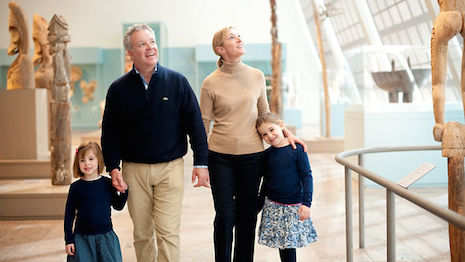 Affluent consumers are most interested in travel. Image credit: Jimmy Choo
Affluent consumers are most interested in travel. Image credit: Jimmy Choo
Affluent consumers are united in a shared affinity for travel as experiences become more important than things.
A new report from YouGov finds that while consumers’ preferred hobbies vary in different regions of the globe, travel comes out on top for all parts of the world. However, while travel is top-of-mind for affluent travelers, YouGov warns that the affluent are beginning to express feelings of travel fatigue, calling for brands to keep their offerings fresh.
"Travel is a universal passion point for people in all walks of life and socio-economic classes," said Cara David, managing partner at YouGov. "Travel is a popular activity because it satisfies the need for discovery in multiple areas: natural beauty, cultural immersion, expanding one’s own understanding of the world we live in, taking in all they can with the purpose of entertainment as well as self-improvement.
"The affluent class is expanding all over the world and with that expansion comes first-timers," she said. "As more and more enter, and rise, in the ranks of affluence, so too will travel continue to prosper."
YouGov’s data comes from its Affluent Perspective 2018 Global Study, which interviewed consumers in the top 10 percent of households based on income. For instance, in the United States, this survey focuses on those with household incomes of at least $150,000.
Enjoying the journey
Affluent hobbies vary around the globe.
French consumers enjoy the theater, while half of well-to-do Chinese individuals show a preference for music. Meanwhile, those in Saudi Arabia are partial to shopping.
However, despite these differences, affluent consumers across the world rank travel as their top interest.
The average affluent individual takes six leisure trips per year. When deciding where to go, consumers are most apt to seek relaxation, mentioned by eight in 10 of those surveyed.
Additionally, 77 percent note they want the chance to escape from everyday life.
For the well-off, travel is a means of self exploration, as 84 percent say venturing away from home helps to define themselves.
Meanwhile, about six in 10 note travel’s potential to make them healthier.
 Four Seasons awakens a mind-body spirit connection for Global Wellness Day. Image credit: Four Seasons
While wellness continues to be a vital aspect of luxury travel brands' experiences, the face of the health movement has shifted.
With affluent travelers' interest in health and wellness becoming an important feature in selecting their next trip, high-end hospitality brands have been forced to embrace it. However, in the past brands and consumers were more focused on fitness, but now digital detoxes and mental health are becoming more popular in catering to today's overly connected affluent, according to data from the Global Wellness Institute (see story).
"Our outlook for wellness travel in luxury is positive," Ms. David said. "If anything, consumers’ interest is increasing with more nuance being added to the definition.
"Passion for health and wellness is number five overall for the global affluent consumer," she said. "American affluents tell us that activities related to 'emotional health' are as popular, and more varied, than activities related to 'physical health.'
"This includes improving their mental acuity through creativity, their physical health with futuristic medical advances and transformational experiences in diet, mind and overall wellbeing that aid emotional resilience."
Per YouGov, affluents also identify travel as a means of reconnecting with loved ones, with 52 percent indicating this benefit.
Four Seasons awakens a mind-body spirit connection for Global Wellness Day. Image credit: Four Seasons
While wellness continues to be a vital aspect of luxury travel brands' experiences, the face of the health movement has shifted.
With affluent travelers' interest in health and wellness becoming an important feature in selecting their next trip, high-end hospitality brands have been forced to embrace it. However, in the past brands and consumers were more focused on fitness, but now digital detoxes and mental health are becoming more popular in catering to today's overly connected affluent, according to data from the Global Wellness Institute (see story).
"Our outlook for wellness travel in luxury is positive," Ms. David said. "If anything, consumers’ interest is increasing with more nuance being added to the definition.
"Passion for health and wellness is number five overall for the global affluent consumer," she said. "American affluents tell us that activities related to 'emotional health' are as popular, and more varied, than activities related to 'physical health.'
"This includes improving their mental acuity through creativity, their physical health with futuristic medical advances and transformational experiences in diet, mind and overall wellbeing that aid emotional resilience."
Per YouGov, affluents also identify travel as a means of reconnecting with loved ones, with 52 percent indicating this benefit.
 Affluents often travel to reconnect with loved ones. Image credit: Mandarin Oriental
Half of respondents also look at travel as an opportunity to learn something new.
Even with the interest towards experiences, about a third of affluent consumers say they sometimes tire of travel. This potential fatigue means that brands need to create new experiences for guests.
Travel trends
Findings from the L.E.K. Consulting Survey show that luxury travel is becoming more popular than ever, with mass consumers adding luxury elements to their trips in an ongoing search for unique experiences.
The meaning of luxury in travel is changing dramatically now that consumers are more interested in experiences over pampering. There is a much broader range of what travelers are spending on while away (see story).
As luxury becomes more accessible to the mass market, affluent consumers are becoming more discriminative with their travel choices.
According to a new luxury travel report by Sienna Charles, ultra-high-net-worth individuals want more opulent travel experiences and are comfortable with the high prices that go along with them. As travel and hospitality brands seek more and more expansions, however, these travelers desire more exclusivity (see story).
"As the great recession ended a few years ago, many of the affluent found themselves buying too many 'things,'" Ms. David said . "As a result, the affluent turned to experiences as a more satisfying way to enrich their lives.
"While it’s hard to imagine that the affluent will ever feel about travel the way they felt about goods, a third report that as much they like travel, sometimes they get tired of it," she said. "This serves as a potent reminder to keep offerings fresh and exciting to stay off their 'been there, done that' list."
Affluents often travel to reconnect with loved ones. Image credit: Mandarin Oriental
Half of respondents also look at travel as an opportunity to learn something new.
Even with the interest towards experiences, about a third of affluent consumers say they sometimes tire of travel. This potential fatigue means that brands need to create new experiences for guests.
Travel trends
Findings from the L.E.K. Consulting Survey show that luxury travel is becoming more popular than ever, with mass consumers adding luxury elements to their trips in an ongoing search for unique experiences.
The meaning of luxury in travel is changing dramatically now that consumers are more interested in experiences over pampering. There is a much broader range of what travelers are spending on while away (see story).
As luxury becomes more accessible to the mass market, affluent consumers are becoming more discriminative with their travel choices.
According to a new luxury travel report by Sienna Charles, ultra-high-net-worth individuals want more opulent travel experiences and are comfortable with the high prices that go along with them. As travel and hospitality brands seek more and more expansions, however, these travelers desire more exclusivity (see story).
"As the great recession ended a few years ago, many of the affluent found themselves buying too many 'things,'" Ms. David said . "As a result, the affluent turned to experiences as a more satisfying way to enrich their lives.
"While it’s hard to imagine that the affluent will ever feel about travel the way they felt about goods, a third report that as much they like travel, sometimes they get tired of it," she said. "This serves as a potent reminder to keep offerings fresh and exciting to stay off their 'been there, done that' list."
